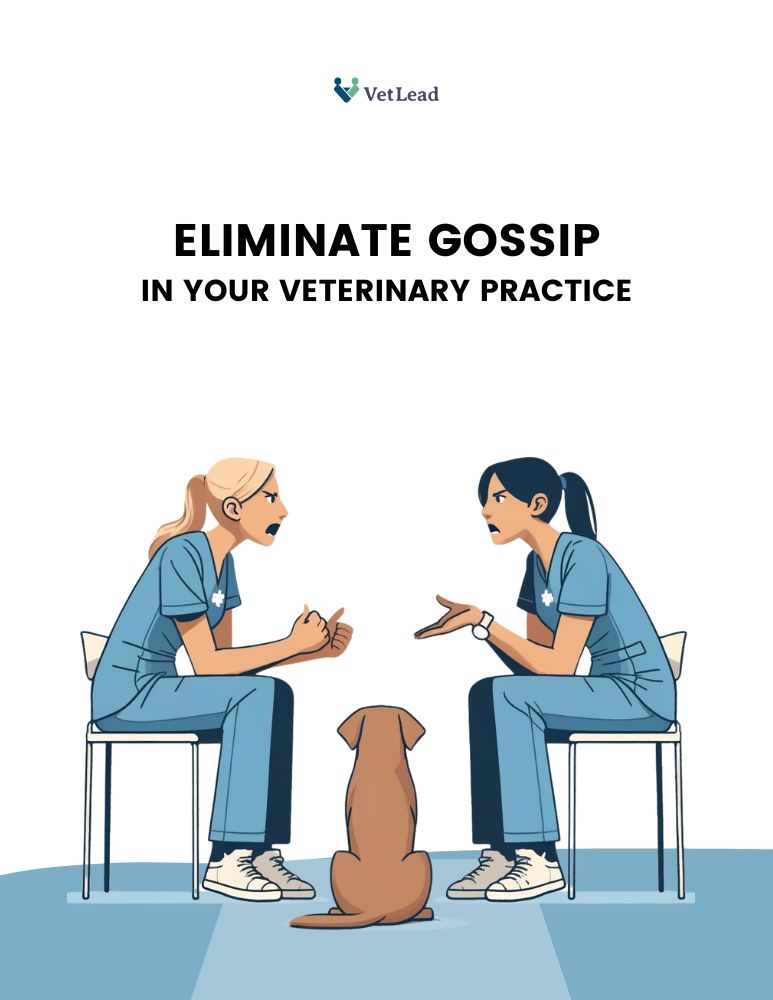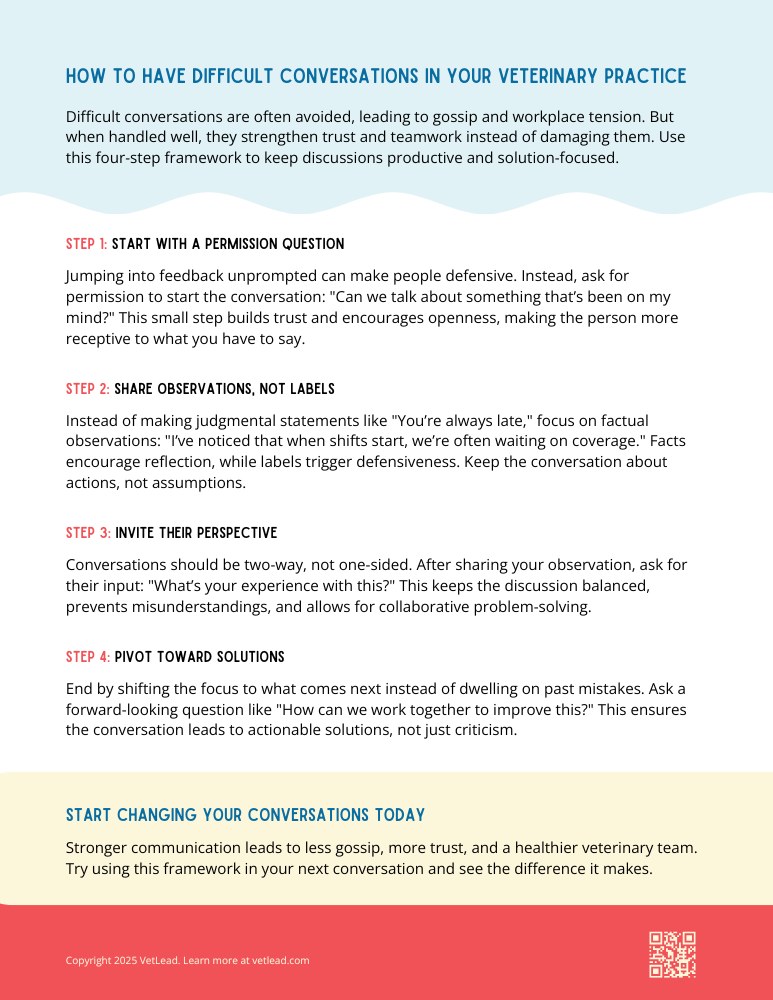Key Takeaways:
- Gossip erodes trust and teamwork and damages your veterinary practice.
- Venting and gossip aren’t the same. Find out how to tell the difference.
- Use a four-step framework to replace gossip with constructive dialogue.
Culture in a veterinary practice isn’t just about policies, leadership, or mission statements—it’s about how people interact every single day. It’s shaped in the moments between appointments, in team meetings, and in the conversations that happen when no one’s watching.
In many veterinary practices, gossip and poor communication slowly erode trust, create unnecessary stress, and make teamwork harder than it needs to be. A casual complaint turns into a habit. Frustrations get discussed in whispers rather than addressed directly. Before long, gossip becomes part of the culture, and the team suffers for it.
How Poor Communication Hurts Your Team
If you’ve ever wondered why your team feels divided or why small issues escalate into major problems, you’re likely dealing with a culture of indirect communication. Let’s break down the hidden cost of gossip, how it differs from venting, and how to shift toward a culture of open, constructive conversations.
How Gossip Undermines Trust and Teamwork
Gossip is one of the most damaging behaviors in a veterinary practice, yet it often starts innocently. A team member expresses frustration about a coworker’s attitude. Another complains about how things are handled. At first, it seems like harmless venting, but over time, these conversations create deeper divisions in the team.
When gossip becomes part of the culture, trust erodes. Team members start questioning whether conversations are happening about them when they’re not around. Collaboration suffers because people hesitate to share ideas or ask for help, afraid of being judged or talked about behind their backs. Instead of addressing problems, the team falls into an “us vs. them” mentality, where cliques form, and minor conflicts grow into major disruptions.
Why Gossip Persists Even When You Try to Ban It
One veterinary practice I worked with attempted to eliminate gossip by implementing a no-gossip policy with strict consequences. But instead of stopping, the gossip just moved into quieter spaces—private conversations, text messages, and social circles outside of work. The culture didn’t improve—it just became harder to manage.
The real issue isn’t the act of gossiping itself—it’s the lack of direct, honest communication. A team that talks about problems without working toward solutions is a team that will always struggle with engagement and trust.

Eliminate gossip in your veterinary practice.
Download this free, comprehensive PDF now.
The Difference Between Venting and Gossiping
Many veterinary professionals confuse gossip with venting, but they serve very different purposes. Venting can be productive—it helps release frustration and process emotions in a way that leads to solutions. Gossip, on the other hand, does the opposite. It reinforces negativity and makes problems worse.
Venting vs. Gossip in Your Veterinary Practice
The key difference is intention. Venting happens when someone shares their feelings with the goal of gaining perspective or finding a path forward. Gossip happens when frustrations are shared without any intent to resolve them.
For example, a technician feeling overwhelmed by a busy schedule might vent by saying, “Today was chaotic, and I need to find a better way to handle my appointments.” That’s venting—it acknowledges frustration but also focuses on improvement. If that same technician says, “Of course I’m drowning, no one else ever pulls their weight around here,” that’s gossip. It blames others, spreads negativity, and fuels resentment.
Venting Without Action in Your Veterinary Practice Is Still Gossip
Many people defend gossip by saying, “I was just venting.” But if the conversation doesn’t lead to a solution, it’s not venting—it’s gossip.
Shifting this mindset starts with awareness. When discussing a workplace challenge, ask: Is this conversation moving toward a solution, or is it just reinforcing frustration? That simple shift can make all the difference in fostering healthier communication.
How to Promote Direct, Constructive Communication
Eliminating gossip isn’t about stopping conversations—it’s about changing them. Veterinary teams that communicate with each other instead of about each other build stronger, healthier workplaces.
One of the biggest barriers to direct communication is fear. Many team members hesitate to address issues head-on because they worry about overstepping or creating conflict. But when teams normalize open, respectful dialogue, feedback becomes a tool for growth instead of a source of discomfort.
Here’s a simple four-step framework for handling difficult conversations:
- Start with a permission question. Instead of diving into feedback unprompted, set the stage: “Can we talk about something that’s been on my mind?”
- Share observations, not labels. Avoid judgmental language. Rather than saying, “You’re always late,” try, “I’ve noticed that when shifts start, we’re often waiting on coverage.”
- Invite their perspective. Ask for their thoughts: “What’s your experience with this?” This keeps the conversation balanced rather than one-sided.
- Pivot toward solutions. End with a forward-looking question: “How can we work together to make this better?”
This approach prevents defensiveness and shifts the conversation from blame to collaboration. The goal isn’t to criticize—it’s to create an environment where people feel comfortable addressing concerns directly.

Take these steps to reducing gossip with you.
Share it with leaders and teams. No email address required.
Building a culture of communication also requires reinforcement from leadership and the team as a whole. Leaders should model these behaviors by addressing concerns transparently, acknowledging positive contributions, and encouraging team members to resolve issues at the source.
When teams practice this consistently, gossip naturally fades. There’s no need to whisper frustrations when people know they can address issues openly and receive support.
Build a Veterinary Team That Communicates with Trust
Gossip and poor communication aren’t just workplace annoyances—they actively weaken teams and create unnecessary stress.
If you want to eliminate gossip in your practice, the solution isn’t banning conversations. It’s about teaching better conversations. Gossip thrives in workplaces where people feel unheard, undervalued, or afraid to speak up. When teams prioritize direct, constructive communication, trust grows, collaboration improves, and engagement increases.
So ask yourself and your team:
- Are we talking about each other or to each other?
- Are we creating a culture where feedback is encouraged, not feared?
- Are we leading by example when it comes to healthy communication?
Small shifts in daily conversations create a culture where honesty thrives, teamwork strengthens, and gossip becomes irrelevant.
